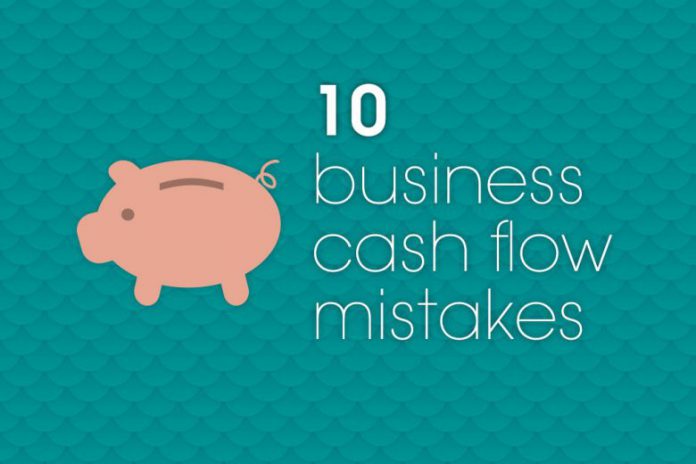Small business owners are often overloaded with tons of activities revolving around their business, and they have very little time left for managing cash flows or scratching their heads on company’s finances. On the other hand, mismanaging your company’s funds might lead to total failure of your business.
Even though you have the brightest of ideas and your company is on the growth ride from the very first day, it is often seen that 80% of the businesses, big or small, fail or close down, just because they cannot manage their cash flows.
To add to the injury, certain hidden costs or expenses have an adverse impact on the cash flows, which are very tough to manage since they cannot be perceived.
In this article, we run through some of the deadly cashflow mistakes that can really hurt your business. Find out if you are making one of these mistakes and learn how to avoid these.
1) Forced Growth
One of my friends who runs a software development company started experimenting with Facebook Ads. In first month itself, he got good returns on his investment. He immediately increased his Ads spend by 5 times anticipating 5x growth in sales.
Well, that didn’t happen. He did generate more leads but not in proportion to the Ads spend. He spent more than he earned in that month and ended up screwing his cash flow. He had to take short term loan to cover up that month’s expenses.
It is a good thing for a company to have a great growth story, but sometimes to have excessive forced growth can spell doom for the business.
What’s forced growth? It would call for more cash to be paid to the staff, bigger office for accommodating more people and clients, a roll-out of new products, higher than needed AD spend, etc. that would call for greater expenses.
These are effort-oriented tasks that need to be handled rapidly as loss of too much cash will severely affect your day-to-day operations. These extended services bring in more revenues, but with revenue comes in more cash outflows. Efficiently estimating these cash outages in due course of time can help you prepare for exigencies.
2) Spending Too Much on Sales
As a small business, it is impervious to fetch new customers, even at the cost of incurring losses. There are two metrics to identify whether your client is bringing you the profit that you anticipated. One of them is the ‘Acquisition Cost’ of the customer, which is the amount spent on gaining one customer.
The other is the ‘Lifetime Value’ of the customer, which is the total revenue generated by a customer over its lifespan. It has to be ensured that the Lifetime value must be greater than the acquisition cost. In this way, a positive effect is felt on the cash flows of the company.
Overspending on the acquisition cost might lead to gaining a small customer with a very limited return. Many businesses falter on this point as they perceive that more the customers, more the profit.
There are lot of hidden elements to the acquisition cost. For example, salary of the sales person, amount spent on his mobile and internet connection, cost of his seat in the office, his commissions, etc. You need to add up all these indirect costs to correctly calculate customer acquisition cost.
If you don’t do this, you’ll unknowingly start burning more money than you earn and eventually affect your cashflow.
3) Incorrect Calculation Of Profitability
One of our customers sells mobile accessories on ecommerce marketplaces. He buys the stuff at 40% margin from his sources. For example, he buys a headphone at $60 and sells it at $100. He used to always believe that he was making 30-40% on every sales considering minor expenses.
But when he prepared his balance sheet at the end of an year, he realised that he made losses. He did not consider the marketplace commission, transaction fee, shipping cost (which varied for every order), cost of storing the inventory and most importantly – cost of returns.
Many-a-times, businesses feel that there is enough profit from every transaction they enter into. However, businesses of all sizes run into severe cash problems because they have committed too much on overheads.
Sometimes, a healthy, cash-rich company buys a huge office or invest too much in rents, fancy utilities, etc. and treat them as trivial at first.
Nevertheless, when the going gets tough, it becomes difficult for the company to keep up with these excessively committed costs and end up losing cash rapidly. Thus, a company can become cash-hungry from a cash-rich company in a matter of time.
Anticipating these expenses and the consequences of the same is necessary for the well-being of the company. One can only be profitable when there is enough money in the bank accounts left after paying off all your expenses.
4) Ignoring Seasonal Nature of the Business
This is applicable for some businesses that do not have a yearlong operation. These businesses find themselves tremendously cash-rich during their peak seasons and on the other hand face difficulty in managing daily cash outflows.
When the cash-rich season begins, it leads to overhead commitments that are difficult to maintain during the off-seasons. Besides, these off-seasons result in discounts and offers, which reduce the margins for the sake of maintaining some level of sales.
There should be enough provisions for these off-seasons in your financial plan. For, e.g., Diwali and Marriage seasons see a lot of sale in Jewellery and Clothes.
However, for the rest of the year, the sales deplete rapidly, resulting in greater cash outflow. As such, there must be ample amount set aside for fixed expenses to be incurred.
5) Sleeping Over Late Payments or Overdue Amounts
Late receipts against your invoices can spell trouble for your business. It may sound trivial, but the fact is, when your customer delays the payments, it would be difficult for you to pay to your vendor.
Moreover, if your vendor does not wait for his payments that would mean you have to pay him off to maintain future credibility. As a result, you will block a major chunk of your funds in this working capital, and you will not be able to make operating expenses easily.
Too much credit can hamper your working capital requirements and suppliers lose credibility very often since payments come in after approximately 3 months. That means no payments or holding expenses for 3 months, which can severely hamper operations on a large scale.
6) Improper Management Of Taxes
Tax is a fine for doing well. Sounds funny but it is true. Taxes are statutory obligations that are obligatory in nature and has to be paid mandatorily, whether you like it or not. Moreover, it has to be paid whenever it is due.
Whenever you miss the deadlines, it can attract interests and penalties that can influence the cash flows. If there are several defaults at the taxpayers’ end, then the Income tax department or the Commercial Taxes Department can come knocking on your door for an audit of operations, again attracting more penalties and interests on penalties. Thus, taxes have to be accounted for, and accurate calculations must be made in the financial plan.
You can seek the help of an expert tax consultant in identifying the approximate amount of tax that you will end up paying the next year. It depends on the growth plan of the company anticipated for the forthcoming year and the financial budget presented by the Ministry of Finance at the beginning of the fiscal year.
A sudden change in the tax rates can also affect the cash outflow. It is often seen in the case of service tax, where if the rates were increased from 12% to 15%. Then after GST rollout, lot of items suddenly fell under 28% tax bracket. Your product or service might have been exempted from tax earlier but may be taxable in GST regime.
So, its always wise to plan for such statutory uncertainties. It has a long lasting impact and making ample provisions for the year to come will always be beneficial to the company.
7) Not Preparing In Advance For Acts of God
This is something which no man has control on. These are totally unexpected and unforeseen expenses, which can seriously damage the cash profile of any company.
A natural disaster can trigger chaos across the country or the geographical zone in which the company operates. One can also lose his entire office following an earthquake.
Your top performer may leave the company at a moment’s notice, or there is a negative complaint from your most reputed customer. Such stuff cannot be anticipated in advance and ultimately end up losing business almost instantaneously.
A contingency plan is what one must have to keep himself safe from these mishaps. There is no way one can avoid these, but can have an emergency fund created to at least maintain the business running with bare necessities.
The best way to secure yourself from any Act of God is Insurance. Most of the top insurance providers have an act of God specifically mentioned in the contracts.
8) Ignoring Credit Score
Having a bad credit score can make it difficult for you to secure a small loan when you need it. When you have lost a major chunk of your machinery, and it would cost a bomb to replace it, the only option that you have is to get a small loan.
But since your performance has not been well in the past, investors might view you as a potential risk and evade themselves from giving short-term loans.
In the end, you end up securing your machinery or even personal assets as collaterals for the loan, which is a huge risk in the long term.
In GST regime, every tax payer will be given a GST compliance rating. As a business owner, you must maintain a good rating which can come handy in cash crunch situations.
9) Cost Of Bad Hiring
This has hurt us multiple times in the past. We hired 3 sales executives from a reputed company. Their resumes were all glorified with achievements. They asked for 30% hike and we agreed. We spend first month on training them. We were hoping that our sales will at least double once these guys become productive.
Nothing happened in next month. Absolutely no sales from these news hires. We thought they might need some time to adjust themselves and waited for another month. They achieved barely 10% of their sales target. Same thing happened in month #4.
Finally we decided to let them go.
Did you see what happened here? We ended up loosing money in those 4 months on training and remuneration. That badly hurt our cashflow.
Later we came up with better hiring process but the point is – cost of bad hire can really make a dent on your cashflow.
10) Miscellaneous Hidden Costs
Some costs seem insignificant in the beginning, but usually, accumulate over the years and when effected, can prove to be a dent to the whole company.
These can be insurance coverage, credit card dues, unforeseen employee attrition, permits/licenses, overdue employee benefits, commercial and legal fees, detention charges by the carriers of goods and much more.
These additional costs cannot be anticipated in advance but may result due to lack of knowledge or awareness of the owners or managers.
Final Thoughts
Cost is like water and can seep through the smallest of holes. A magnet of sorts attracts expenses and outflows. When you have a proper financial plan that estimates or provides for all kinds of costs, be it exigencies, contingencies or thought for, it is always beneficial for the company. It helps the owners to be prepared for all kinds of situations and not fall into the trap of working capital overruns.
Some costs can be felt instantaneously given the nature of its source. The above 9 items enumerate how some costs, hidden in nature, can lead to worry-some situations for the owners, which can be safeguarded by keeping ample provision in the books of accounts.



















